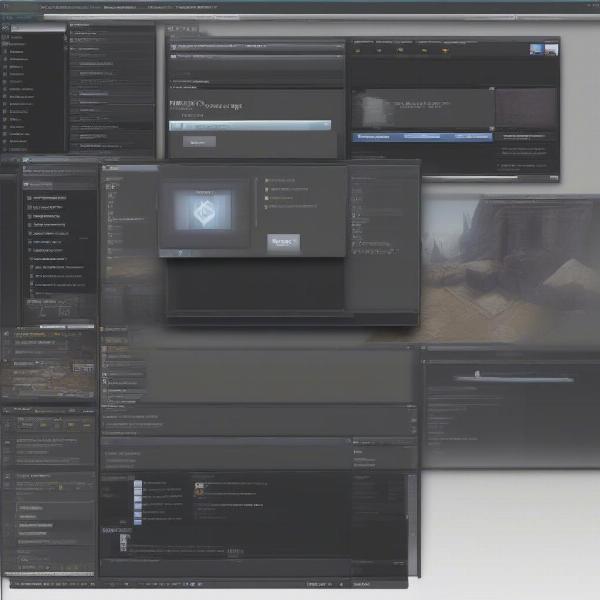The question of whether Unreal Engine can make mobile games is a hot topic among aspiring and seasoned developers alike. It’s a powerful tool, renowned for its stunning visuals and robust features in the PC and console space, but does it translate well to the mobile environment? Here at Supreme Duelist Blog, we’re dedicated to providing you with the most insightful analysis of game development and the technologies shaping it. Let’s delve into the intricacies of using Unreal Engine for mobile game creation, uncovering its potential and limitations.
At Supreme Duelist Blog, we always strive to keep you on the cutting edge of game development. We understand the constant need for up-to-date information and cutting-edge analysis, especially when it comes to powerful game engines. Exploring the mobile development capabilities of Unreal Engine is therefore a crucial part of our mission, so let’s get started!
Unreal Engine for Mobile: Is it a Good Fit?
The short answer is yes, Unreal Engine can make mobile games, and it does so incredibly well. However, it’s not a simple drag-and-drop process. It requires careful planning, optimization, and a solid understanding of mobile hardware limitations. The engine provides a wealth of tools and features specifically tailored for mobile development, including a robust mobile rendering pipeline, touch input support, and mobile-specific optimization options.
The Pros of Using Unreal Engine for Mobile
- High-Quality Visuals: Unreal Engine is known for its ability to produce visually stunning graphics. This translates to mobile as well, allowing developers to create mobile games that rival console-quality visuals.
- Cross-Platform Development: Unreal Engine enables you to develop your game once and deploy it on multiple platforms, including Android and iOS, saving valuable development time and resources.
- Extensive Feature Set: From animation tools to physics simulations, Unreal Engine provides a comprehensive set of features that streamline the development process.
- Marketplace Assets: The Unreal Engine Marketplace is a treasure trove of pre-made assets, including models, textures, and blueprints, accelerating the development of your mobile game.
- Active Community: A large and active community provides ample resources, tutorials, and support for developers using Unreal Engine for mobile.
 Unreal Engine mobile game development interface showcasing various tools and options
Unreal Engine mobile game development interface showcasing various tools and options
The Cons of Using Unreal Engine for Mobile
- Steep Learning Curve: Unreal Engine has a relatively steep learning curve, especially for beginners. While it’s powerful, it takes time and effort to master.
- Resource Intensive: Unreal Engine games can be resource-intensive, and if not optimized properly, can cause performance issues on some older or lower-end mobile devices.
- Larger App Sizes: Unreal Engine projects typically result in larger app sizes compared to games built with other engines, which can be a concern for some users.
- Optimization Challenges: Optimizing Unreal Engine games for mobile devices requires a deeper understanding of mobile rendering and performance constraints.
- Code Complexity: Debugging and fixing issues can be challenging due to the complexity of the engine’s underlying code.
“Unreal Engine’s capabilities for mobile are undeniable, but it’s paramount for developers to truly understand the performance constraints on the platform,” says Dr. Eleanor Vance, a Mobile Game Optimization Expert. “Without a dedicated effort in optimization, a graphically rich Unreal Engine mobile game can quickly turn into an unplayable slideshow.”
Key Considerations for Unreal Engine Mobile Development
Developing a mobile game with Unreal Engine requires a different approach than a desktop or console game. Here are some essential factors to consider:
- Mobile-First Design: Start with a mobile-first mindset. This means designing your game with touch controls, small screens, and mobile device limitations in mind from the outset.
- Performance Optimization: Prioritize performance optimization. Profile your game and identify bottlenecks. Use techniques such as level of detail (LOD) settings, texture compression, and mobile-specific rendering features.
- Asset Optimization: Optimize your game assets, such as models and textures, to reduce their size and improve performance. Use LOD groups to reduce the poly count as objects move further away from the camera.
- UI/UX Design: Design your UI/UX specifically for mobile screens. Keep it simple, intuitive, and responsive to touch inputs.
- Testing: Thoroughly test your game on a range of mobile devices with different specifications to ensure a consistent experience across the board.
Optimizing Mobile Game Performance with Unreal Engine
- Lowering Resolution: Utilize dynamic resolution scaling or a fixed lower resolution for less powerful devices.
- Adjusting Shadow Quality: Reduce the quality or number of shadows displayed for performance gains.
- Optimizing Post-processing Effects: Scale back on costly post-processing effects such as bloom or depth of field.
Is Unreal Engine the Right Choice for Your Mobile Game?
Deciding whether or not to use Unreal Engine for your mobile game depends heavily on the type of game you are developing, your resources, and your goals.
When Unreal Engine is a Great Choice
- Visually Demanding Games: If you’re aiming for high-fidelity graphics, Unreal Engine shines.
- Complex Games: For complex games with intricate systems, Unreal’s versatility is a huge advantage.
- Experienced Developers: Experienced developers who have a solid understanding of game development and optimization will benefit from Unreal Engine’s power.
- Cross-Platform Projects: When cross-platform deployment is a requirement.
When Unreal Engine Might Not Be the Best Choice
- Simple, Casual Games: If your game is a simple 2D title or a very casual game, a lighter engine like Unity or Godot might be more suitable.
- Limited Resources: If you have a limited budget or small team, the learning curve and complexities of Unreal Engine can be a barrier.
- Rapid Development: If rapid prototyping is your goal, a more straightforward engine may be easier to use.
- Low End Mobile Target: If you are specifically targeting extremely low-end hardware, other less demanding engines will be a better fit.
 Comparison of games made with different engines on mobile devices showing varying levels of visual fidelity
Comparison of games made with different engines on mobile devices showing varying levels of visual fidelity
Frequently Asked Questions
Can you make a 2D game with Unreal Engine?
Yes, you can absolutely make a 2D game with Unreal Engine. Although known for 3D games, Unreal also offers Paper2D, a plugin specifically for 2D game development, complete with tilemap tools, sprite animation capabilities and more.
What programming language does Unreal Engine use?
Unreal Engine primarily uses C++ for its core functionalities. However, it also provides Blueprint Visual Scripting, which allows users to develop game logic visually without needing extensive programming knowledge.
How much does it cost to use Unreal Engine?
Unreal Engine is free to use for development. However, a 5% royalty is required for games with earnings exceeding $1 million, although the revenue from the Unreal Engine market is not included in the calculation.
What are the system requirements for developing on Unreal Engine?
Developing on Unreal Engine requires a relatively powerful PC with a decent processor, a dedicated graphics card and at least 8GB of RAM. Optimal requirements would include a powerful graphics card and 16GB of RAM.
How can I learn to use Unreal Engine for mobile games?
There are countless online resources such as the official Unreal Engine documentation, YouTube tutorials, courses on platforms like Udemy and Coursera, and also the Unreal Engine forums and community boards which can be invaluable for both beginners and advanced users alike.
“Mobile optimization isn’t an afterthought; it’s a fundamental part of the development process,” stated David Chen, a Senior Game Programmer specializing in cross-platform games. “Ignoring the unique challenges of mobile devices can lead to serious performance issues down the line.”
Conclusion
The answer to the question, ” Can Unreal Engine Make Mobile Games?”, is a resounding yes. It’s a versatile and powerful tool that offers the potential for creating stunning and complex mobile game experiences. However, it’s crucial to be aware of the challenges involved and to approach mobile development with careful planning and a focus on optimization. If you’re looking to push the boundaries of mobile game visuals and complexity, Unreal Engine is certainly a contender. At Supreme Duelist Blog, we will continue to provide in-depth analysis to help you make informed decisions about all your game development endeavors. We encourage you to explore our other articles and resources to further enhance your knowledge and skills. Come back to Supreme Duelist Blog for more insights!
Leave a Reply